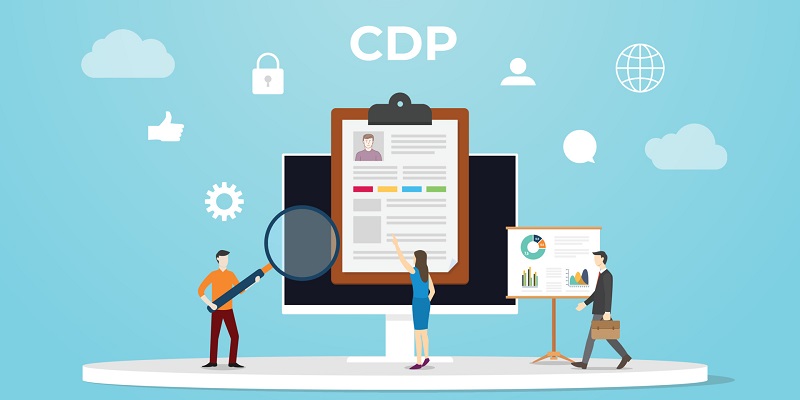In the age of data-driven decision-making, businesses are increasingly recognizing the critical role of customer data in fueling their growth and success. A customer data platform (CDP) has emerged as specialized software, revolutionizing how organizations collect, organize, and centralize customer data from various touchpoints in real-time. This article delves into the capabilities and benefits of CDPs, showcasing their ability to create comprehensive and unified customer profiles, fuel personalized marketing campaigns, ensure data compatibility, management, and protection, provide deep insights into customer behavior, and offer a multidimensional view to drive data-driven decision-making.
Comprehensive Customer Profiles
Delivering personalized experiences requires a holistic understanding of customers. CDPs shine in their ability to aggregate diverse data from multiple touchpoints, spanning web interactions to in-store purchases. By leveraging this wealth of information, CDPs enable businesses to create comprehensive, 360-degree profiles of each customer. This consolidated view not only provides a deeper understanding of customer preferences, behaviors, and buying patterns but also helps uncover valuable insights that can drive informed marketing strategies.
Personalized Marketing Campaigns
One of the most significant advantages of CDPs lies in their ability to harness the vast amounts of customer data they handle. Armed with detailed customer profiles, businesses can develop highly personalized marketing campaigns that deeply resonate with their audience. By tailoring messaging, offers, and experiences based on individual preferences, CDPs empower marketers to deliver targeted, relevant content at the right time, significantly enhancing customer engagement and conversion rates.
Compatibility with Marketing Tools and Platforms
CDPs offer not only standalone capabilities but also seamless integration with a wide range of marketing tools and platforms. This compatibility ensures a smooth flow of data, enabling businesses to rely on real-time customer insights to drive marketing strategies and responses. By efficiently coordinating with marketing automation platforms, email marketing tools, and customer relationship management (CRM) systems, CDPs allow organizations to amplify the impact of their marketing efforts and deliver personalized experiences across various touchpoints.
Data Management and Protection
Centralizing data management through a CDP mitigates the risks of duplication and inaccuracies, providing businesses with a single source of truth. Moreover, CDPs prioritize data protection by offering robust security features to ensure compliance with privacy regulations. By implementing stringent data protection measures, CDPs safeguard customer privacy, reinforcing trust and loyalty while reducing the potential for data breaches.
Deep Insights into Customer Behavior
By consolidating disparate data sources, CDPs offer businesses a singular, coherent view of their customers. This enhanced understanding of customer behavior and preferences enables organizations to make data-driven decisions that align with customer needs. Analyzing the collected data helps uncover patterns, trends, and correlations that inform the development of effective marketing strategies, product enhancements, and overall business growth.
Multi-dimensional Customer View
CDPs transcend the boundaries of first-party data by seamlessly integrating second-party and third-party data sources. By skillfully combining these various data dimensions, CDPs provide businesses with a comprehensive view of their customers. This multi-dimensional perspective aids in understanding customer interactions, preferences, and purchase behaviors across multiple channels. Armed with this holistic understanding, organizations gain a competitive edge, enabling them to deliver personalized experiences that drive customer loyalty and advocacy.
The Importance of Customer Data
In today’s digital landscape, customer data has become the lifeblood of business operations. It serves as the key to unraveling customer preferences, behaviors, and buying patterns. CDPs unlock the potential of customer data, harnessing it to fuel growth, enhance customer experiences, and gain a competitive advantage in the market.
Benefits of a Well-Implemented CDP
A well-implemented CDP positively impacts business outcomes in various ways. By driving customer engagement and optimizing marketing efforts, CDPs empower organizations to deliver personalized experiences that resonate with individuals. Moreover, CDPs foster lasting customer relationships by consistently delivering value, building trust, and exceeding customer expectations.
In a data-driven world, a customer data platform emerges as a catalyst for success. By harnessing the power of customer data, businesses can unlock valuable insights, develop personalized marketing strategies, and build lasting customer relationships. Implementing a CDP enables organizations to consolidate and centralize their customer data, ensuring compatibility, management, protection, and deep insights into customer behavior. It’s time for businesses to seize the transformative potential of CDPs and revolutionize their approach to customer engagement. By leveraging the capabilities of CDPs, organizations can position themselves at the forefront of personalized marketing and elevate their competitive standing in the market.

